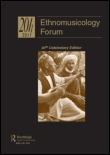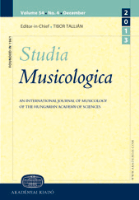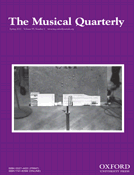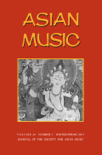
Ethnomusicology Forum
Scope & Guideline
Exploring the Soundscapes of Culture
Introduction
Aims and Scopes
- Cultural Identity and Nationalism:
Research often centers on how music reflects and shapes cultural identities, particularly in the context of nationalism and regional identity politics, as seen in studies of music in Portugal, Spain, and various ethnic groups. - Music and Social Change:
The journal emphasizes the role of music in social movements, education, and political activism, exploring topics such as hip-hop in education and the implications of music in diasporic communities. - Sustainability and Intangible Cultural Heritage:
There is a notable emphasis on music's role in sustainability and the preservation of cultural heritage, particularly in studies addressing ecological concerns and the transmission of folk traditions. - Decolonization and Global Perspectives:
The journal consistently addresses themes of decolonization and the global music landscape, examining the historical and contemporary impacts of colonialism on music and cultural expressions. - Interdisciplinary Approaches:
Ethnomusicology Forum applies interdisciplinary methodologies, drawing from fields such as anthropology, sociology, and history to provide a comprehensive understanding of musical practices in various contexts.
Trending and Emerging
- Music and Social Justice:
There is a growing focus on the intersection of music and social justice, including topics like racial identity, activism through music, and the role of music in addressing societal inequalities. - Digital Ethnomusicology:
The rise of digital technologies in music production and distribution is an emerging theme, with studies exploring how these technologies impact cultural practices and the accessibility of music across different communities. - Ecological and Environmental Music Studies:
Research exploring the relationship between music and ecological issues is on the rise, highlighting how musical practices can contribute to environmental awareness and sustainability. - Transnational and Diasporic Music Practices:
There is an increasing interest in transnational music practices and the experiences of diasporic communities, examining how music serves as a medium for cultural exchange and identity formation. - Decolonial Perspectives in Music Studies:
Emerging discussions around decolonial approaches to music studies are becoming more prevalent, focusing on the implications of colonial histories in contemporary music practices and scholarship.
Declining or Waning
- Traditional Ethnomusicological Studies:
There is a noticeable decline in papers focused solely on traditional ethnomusicological fieldwork, indicating a shift towards more contemporary and applied studies that intersect with other disciplines. - Historical Musicology:
Studies that concentrate exclusively on historical musicology, such as archival research or historical performance practices, are appearing less frequently, suggesting a move towards discussions that are more relevant to current societal issues. - Music Theory and Analysis:
Research that primarily deals with music theory or technical analysis of music is waning, as the journal increasingly favors discussions that incorporate social, cultural, and political perspectives. - Regional Music Studies:
Specific regional studies, such as those focusing solely on one geographical area without broader implications, seem to be decreasing, possibly in favor of more global or comparative analyses.
Similar Journals

Muzikoloski Zbornik
Championing Open Access in Music ScholarshipMuzikoloski Zbornik is a prominent open-access journal in the field of musicology, published by the esteemed University of Ljubljana Press since 1965. Hailing from Slovenia, this journal has been dedicated to advancing the study of musical heritage, theory, and practice, serving as a vital platform for researchers, professionals, and students alike. With a notable Q2 category ranking in the field of music and a Scopus ranking of 109 out of 180 in Arts and Humanities, Muzikoloski Zbornik showcases high-quality research, fostering discourse and collaboration among scholars globally. The journal embraces a diverse range of topics, from ethnomusicology to music education, ensuring its relevance in an ever-evolving academic landscape. By providing unrestricted access to its content, it champions the dissemination of knowledge and supports the growth of the musicology discipline.

Problemy Muzykalnoi Nauki-Music Scholarship
Unveiling the Richness of Musical ResearchWelcome to Problemy Muzykalnoi Nauki-Music Scholarship, a leading journal in the field of music scholarship published by the esteemed Gnesin Russian Academy of Music. With an ISSN of 2782-358X and an E-ISSN of 2782-3598, this Open Access journal has been committed to the dissemination of high-quality research since 2009, making scholarly work accessible to a global audience. Covering diverse aspects of music theory, history, and its socio-cultural impacts, Problemy Muzykalnoi Nauki serves as an essential platform for scholars, educators, and practitioners in the arts and humanities, as well as in social sciences related to music education. While its Scopus coverage was discontinued in 2021, the journal remains influential, holding a rank of #48 in the Arts and Humanities category and a percentile of 67th, showcasing its relevance and rigor in the discipline. We invite researchers and students alike to explore the rich contributions made within these pages, fostering a deeper understanding and appreciation of music in contemporary society.

Musica Oral del Sur
Celebrating the Rich Tapestry of Southern SoundscapesMusica Oral del Sur is a prominent academic journal published by the Junta Andalucía through the Centro Documentación Musical Andalucía. With its ISSN 1138-8579 and E-ISSN 2445-0391, this pioneering publication has championed open access since 1995, providing a vital platform for scholars dedicated to the exploration of traditional and contemporary oral music practices in Southern Spain and beyond. The journal is essential for researchers, professionals, and students interested in musicology, ethnomusicology, and cultural studies, promoting scholarly discourse through a rich assortment of articles, reviews, and field research. Set in the vibrant cultural landscape of Granada, the journal encourages the fusion of theoretical insights with practical implications, making significant contributions to the understanding of oral musical traditions. By fostering accessible academic dialogue, Musica Oral del Sur plays an invaluable role in preserving and highlighting the heritage of Southern musical expressions while addressing contemporary issues in the field.

Studia Musicologica
Navigating the Soundscapes of Diverse Musical TraditionsStudia Musicologica, published by AKADEMIAI KIADO ZRT, stands as a leading journal in the field of musicology, dedicated to the exploration and analysis of music across diverse cultures and historical contexts. With its ISSN 1788-6244 and E-ISSN 1789-2422, this journal provides an essential platform for disseminating high-quality research and critical analyses, thereby contributing significantly to scholarly discourse in music studies. Although it operates on a traditional access model, its rigor and foundational contributions ensure that it remains invaluable for researchers, professionals, and students alike. Situated in the heart of Hungary, Studia Musicologica engages with a broad spectrum of topics including music theory, ethnomusicology, and music history, fostering a deeper understanding of music's multifaceted role in society. This makes it an essential resource for anyone interested in advancing their research or professional practice within the expansive field of musicology.

MUSICAL QUARTERLY
Advancing Musicology Through Critical DiscourseMUSICAL QUARTERLY, published by Oxford University Press Inc, is a distinguished journal in the field of music, with a publication history that stretches back to 1915. This esteemed journal, identifiable by its ISSN 0027-4631 and E-ISSN 1741-8399, provides a critical platform for scholarly discourse, analysis, and research in musicology and related disciplines, facilitating an understanding of both historical and contemporary musical practices. Although it operates without open access, it continues to attract a diverse readership of researchers, educators, and students alike, thanks to its well-curated articles and reviews that engage with music theory, history, and ethnomusicology. With a current Scopus rank of #119 out of 180 in the Arts and Humanities category and a 34th percentile ranking in Music, MUSICAL QUARTERLY plays a vital role in advancing knowledge and fostering collaboration within the music academic community. Its commitment to high-quality scholarship is reflected in its ongoing efforts to address the evolving landscape of music studies, making it an essential resource for anyone serious about exploring the rich tapestry of music scholarship.

Opus
Connecting Scholars Through Open AccessOpus is an esteemed open-access journal published by the Associação Nacional de Pesquisa e Pós-Graduação em Música in Brazil, focusing on the field of music studies. With an ISSN of 1517-7017, Opus has been dedicated to fostering innovative research since its inception and has embraced the open-access model since 2009, ensuring that its findings are readily accessible to scholars and enthusiasts globally. The journal has achieved a commendable Q2 ranking in Music as of 2023, showcasing its impact and relevance within the arts and humanities. Although currently ranked #130 out of 180 in Scopus in the music category, Opus maintains a commitment to enhancing the scholarly discourse in musicology through empirical studies, theoretical analyses, and interdisciplinary approaches. The journal's convergence over the years, from 2017 to 2024, reflects its dedication to evolving educational and research methodologies in music. Situated in the vibrant academic landscape of Campinas, SP, Brazil, Opus invites researchers, professionals, and students to contribute to its mission of exploring the multifaceted dimensions of music.

ASIAN MUSIC
Fostering Interdisciplinary Insights into Asian Music.ASIAN MUSIC is a distinguished academic journal published by University of Texas Press, focusing on the rich and diverse musical traditions of Asia. With an ISSN of 0044-9202 and an E-ISSN of 1553-5630, this journal serves as a key platform for interdisciplinary research that encompasses musicology, ethnomusicology, and cultural studies related to Asian music practices. While ASIAN MUSIC is not an open-access journal, it provides valuable insights and scholarly articles that contribute significantly to the understanding of music’s role within Asian cultures. The journal originally covered works from 2002 to 2010 and has a reputation for fostering discussions that celebrate the intricacies of sound, performance, and society. Targeting researchers, professionals, and students alike, ASIAN MUSIC stands as a crucial resource for those engaged in the study of music in its multifaceted context.

INTERNATIONAL REVIEW OF THE AESTHETICS AND SOCIOLOGY OF MUSIC
Transforming Perspectives on Music and Its Social FabricThe INTERNATIONAL REVIEW OF THE AESTHETICS AND SOCIOLOGY OF MUSIC, published by the Croatian Musicological Society, is a pivotal scholarly journal dedicated to the intricate intersection of music, aesthetics, and sociology. With a special focus on exploring the cultural and social dimensions of music, this journal serves as a platform for researchers, professionals, and students alike to disseminate innovative ideas and transformative research. Although it operates under a traditional access model, the journal's impact within the field of music studies is underscored by its commendable Scopus ranking in the Q3 category and its established history from 2009 to 2016, with a renewed focus from 2018 to 2023. With an ISSN of 0351-5796, it continues to shape academic discourse with its insightful contributions and is essential for those aiming to engage deeply with the evolving dynamics of music in society.

ACTA MUSICOLOGICA
Pioneering Conversations in the World of MusicologyACTA MUSICOLOGICA, published by the International Musicological Society, stands as a pivotal journal within the field of Musicology, garnering attention from scholars and practitioners alike. With its ISSN 0001-6241, the journal serves as a vital platform for innovative research and discourse from 2002 to 2013 and again from 2016 to 2024, achieving a Q2 ranking in the 2023 Music category. Reflecting a commitment to excellence, it ranks #105 out of 180 in Arts and Humanities Music according to Scopus, placing it at the 41st percentile among its peers. Although not open access, ACTA MUSICOLOGICA ensures the dissemination of significant musical research, fostering scholarly exchange and exploration. This esteemed publication is essential for researchers, professionals, and students looking to deepen their understanding of musicology and contribute to ongoing academic conversations.

Musicology Today
Advancing Music Research for a Global AudienceMusicology Today, published by SCIENDO, is a pivotal journal in the field of musicology, presenting a platform for scholars, researchers, and practitioners to disseminate their findings and engage with current trends in music research. With its ISSN 1734-1663 and E-ISSN 2353-5733, the journal aims to provide a comprehensive overview of various aspects of music, including theory, history, and ethnomusicology, fostering a multidisciplinary dialogue among its contributors. Located in Warsaw, Mazovia, Poland, this journal is not only committed to high academic standards but also to promoting open access to knowledge, thereby enhancing accessibility for a global audience. As it continues to bolster its reputation in the academic community, Musicology Today plays an essential role in shaping the future of music scholarship and invites the engagement of seasoned researchers and emerging voices alike.